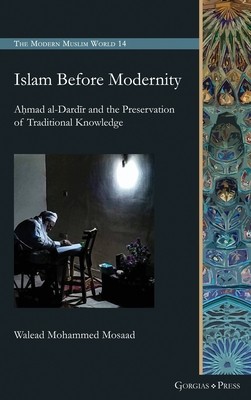
- We will send in 10–14 business days.
- Author: Walead Mohammed Mosaad
- Publisher: Gorgias Press
- ISBN-10: 1463243804
- ISBN-13: 9781463243807
- Format: 15.2 x 22.9 x 2.2 cm, hardcover
- Language: English
- SAVE -10% with code: EXTRA
Reviews
Description
This book examines the role of tradition and discursive knowledge transmission on the formation of the 'ulamā', the learned scholarly class in Islam, and their approach to the articulation of the Islamic disciplines. The basis of this examination is the twelfth/eighteenth century scholar, Aḥmad ibn Muḥammad al-Dardīr, an Egyptian Azharī who wrote highly influential treatises in the disciplines of creedal theology, Mālikī jurisprudence, and taṣawwuf (Sufism). He also occupied a prominent role in the urban life of Cairo, and is accredited with several incidents of intercession with the rulers on behalf of the Cairo populace. This book argues that a useful framework for evaluating the intellectual contributions of post-classical scholars such as al-Dardīr involves the concept of an Islamic discursive tradition, where al-Dardīr's specific contributions were aimed towards preserving, upholding, and maintaining the Islamic tradition, including the intellectual "sub-traditions" that came to define it.
EXTRA 10 % discount with code: EXTRA
The promotion ends in 19d.05:44:59
The discount code is valid when purchasing from 10 €. Discounts do not stack.
- Author: Walead Mohammed Mosaad
- Publisher: Gorgias Press
- ISBN-10: 1463243804
- ISBN-13: 9781463243807
- Format: 15.2 x 22.9 x 2.2 cm, hardcover
- Language: English English
This book examines the role of tradition and discursive knowledge transmission on the formation of the 'ulamā', the learned scholarly class in Islam, and their approach to the articulation of the Islamic disciplines. The basis of this examination is the twelfth/eighteenth century scholar, Aḥmad ibn Muḥammad al-Dardīr, an Egyptian Azharī who wrote highly influential treatises in the disciplines of creedal theology, Mālikī jurisprudence, and taṣawwuf (Sufism). He also occupied a prominent role in the urban life of Cairo, and is accredited with several incidents of intercession with the rulers on behalf of the Cairo populace. This book argues that a useful framework for evaluating the intellectual contributions of post-classical scholars such as al-Dardīr involves the concept of an Islamic discursive tradition, where al-Dardīr's specific contributions were aimed towards preserving, upholding, and maintaining the Islamic tradition, including the intellectual "sub-traditions" that came to define it.


Reviews